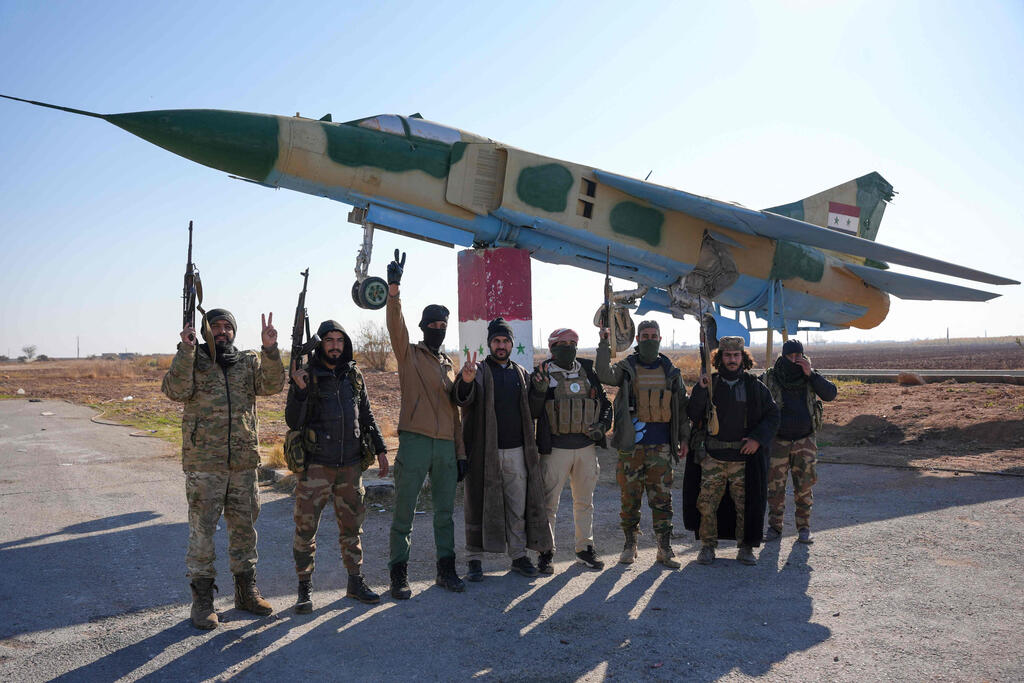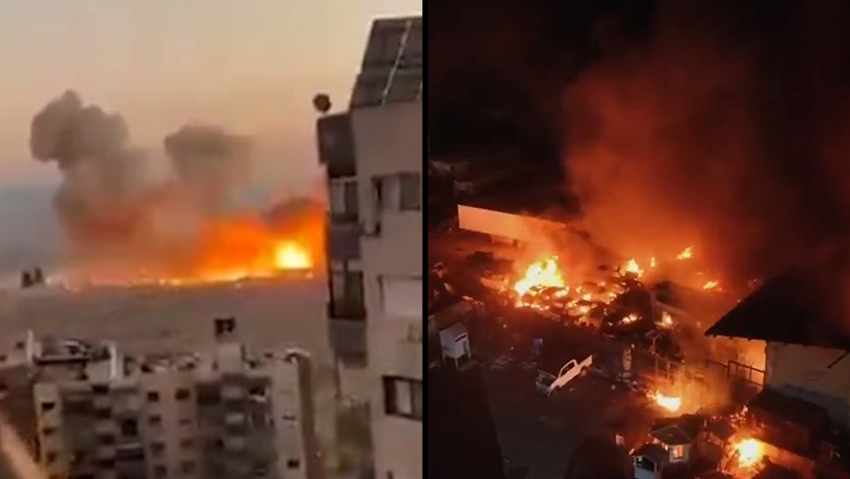In what is now a bygone age, on November 26 this year, the West was celebrating that it had coerced Israel into a cease-fire in Lebanon. The very next day, the roof fell in, across the border in Syria. The status quo has collapsed everywhere, and the West will not be able to avoid the consequences.
Less than a fortnight ago, U.S. President Joe Biden announced a supposed diplomatic triumph, a feather in the cap of his expiring presidency. America had ended “the devastating conflict” in Lebanon by means of a cease-fire, and this was meant to “remind us that peace is possible.” Not explicitly stated by Biden, but very obviously implied, was the idea that war is futile, and cannot bring about fundamental change, as opposed to peace initiatives.
6 View gallery


Syrian rebels in Damascus celebrate Assad's downfall
(Photo: Ali Haj Suleiman/Getty Images)
Two days later, Biden’s unusually brazen and exceptionally obtuse cease-fire envoy, Amos Hochstein, made it clear that the arrangement involved the deliberate rejection of a central Israeli security requirement.
To quote him precisely, Mr. Hochstein said that “There are fantasy deals, that are utopia, where you get a cease-fire agreement with a security zone, etc…. but those won’t ever happen.” Of course, the substantive meaning of this is that the cease-fire would allow Hezbollah to return to positions along Israel’s northern border, and directly menace Israel again.
In between Biden’s and Hochstein’s equally contemptible statements, on November 27, the roof fell in on Bashar Assad’s Syrian regime. The rebels suddenly attacked his forces in Aleppo province, and on the very first day, the largest army base in western Aleppo had fallen.
6 View gallery


Rebels in Syria celebrate at a military air base captured in Aleppo province
(Photo: Rami al SAYED / AFP)
It took twelve days for Assad’s army to demonstrate that it had no intention of fighting, and for him to flee to Russia. Not for the first time, but perhaps for the first time in a manner this extraordinary, the West’s strategy of pretending there is still a status quo capable of being preserved was exposed as both a fantasy and a utopia.
The status quo is gone
The entire world has decisively lost the final vestiges of stability. Whether it is South Korean President Yoon Suk Yeol’s ludicrous imposition and then cancellation of martial law, the annulment of election results in Romania, the authoritarian Georgian regime's persecution of its opponents or the continuing awful war in Ukraine, there is no status quo in sight anywhere.
Nowhere is the obliteration of the status quo clearer to all than in Syria. As Nadav Eyal rightly emphasizes, essentially nobody in a position of influence was substantively concerned by Bashar Assad’s atrocities. This in spite of the fact that, as Firas Meksad of the Middle East Institute reminds us, Bashar’s and his father’s regime “oppressed, tortured and disappeared many millions in Syria” over the course of decades. Of course, the gangsters who run the International Criminal Court (ICC) never issued a warrant for al-Assad’s arrest.
Now, having done precisely nothing to remove Bashar from power, Emmanuel Macron is possessed of a sufficient quantity of hypocrisy to declare that “The barbaric state has fallen. At last.” Across the border in Germany there is another hypocrite, Annalena Baerbock, the foreign minister, writes of an “eternity of atrocities committed by the Assad regime,” while failing to enumerate what she did to put an end to these atrocities, because there is nothing to enumerate.
Such political leaders, who have all the intelligence and integrity of minor fraudsters, have taken the world into its current crisis, where the status quo has evaporated. Yet, even mentioning this is far from welcome in polite company.
Israel contributed to Assad’s fall, but is acting too slowly now
Israel, unlike the West, did make a fundamental contribution to bringing down the house of Assad. Prime Minister Benjamin Netanyahu is entirely correct that “this is a direct result of the blows we delivered to Iran and Hezbollah.” It is entirely probable that without Israel’s actions, Assad would still now be in power. Yet, Israel’s response to his fall is feeble.
Israel’s widely reported strikes on Syria following the regime’s collapse are a useful contribution to its own and to international security, but these actions fit a stereotypical pattern and may not be entirely wise in specific instances.
For example, bombing an air base in the Druze town of Sweida might be short-sighted in the sense that it destroys weapons that the Druze could have employed to strengthen themselves, and defend themselves in the future against common enemies of Israel and Syria’s Druze. It is impossible to be certain of this, since the precise details of Israel’s strikes are correctly kept secret, but Israel’s actions leave a distinct impression of tactical success without strategic planning.
Get the Ynetnews app on your smartphone: Google Play: https://bit.ly/4eJ37pE | Apple App Store: https://bit.ly/3ZL7iNv
Israel should act to comprehensively destroy anything that currently remains of Iran’s presence in Syria, and it should consider formally abandoning the cease-fire with Lebanon and obliterating Hezbollah.
This is urgent, since regardless of the fall of Assad, the core strategic situation is far from favorable to Israel. Iran is “increasing dramatically” its production of not-quite weapons grade enriched uranium, and even the head of the International Atomic Energy Agency (IAEA) is forced to voice publicly that “we do not have any diplomatic process ongoing which could lead to a de-escalation.” In fact, as decades of futile negotiations prove, no diplomatic process with Iran can or will lead anywhere.
The West remains passive, but this cannot last
The West is doing nothing at all, even after Assad has fled, and his regime vanished into history. On Friday, U.S. President-elect Donald Trump swatted away criticism of his nominee for director of national intelligence, Congresswoman Tulsi Gabbard, who met with Assad in 2017, more than four years after he gassed around 1,500 Syrians to death in Ghouta.
In the same interview with NBC, Syria was mentioned only once more, and Trump casually speculated that Assad’s regime might fall. On Sunday, Trump followed up by using Syria as a mere prop in a text dedicated to pursuing a cease-fire in the war in Ukraine.
Trump does not appear to have a Syria policy, nor any intention of developing one. Other Western nations adhere to the same position. Keir Starmer, Britain's prime minister without a plan, as usual, calls “on all sides” to do good things and not do bad ones, this time in a statement shorter than a dinner menu. Not a single Western leader has or will announce a policy of passive isolationism as their chosen approach to the Middle East, but it is the policy that they are pursuing in practice.
With Iran now very close to obtaining the worst weapon of them all, and with Turkish-supported groups already attacking the Kurds with considerable force in the Syrian city of Manbij, the West will not be able to keep its eyes tightly shut for very much longer. In the meantime, Israel should not wait, but should set the agenda by force of arms.
- Dan Zamansky is a British-Israeli independent historian and author of The New World Crisis, a Substack analyzing the problems of today.






